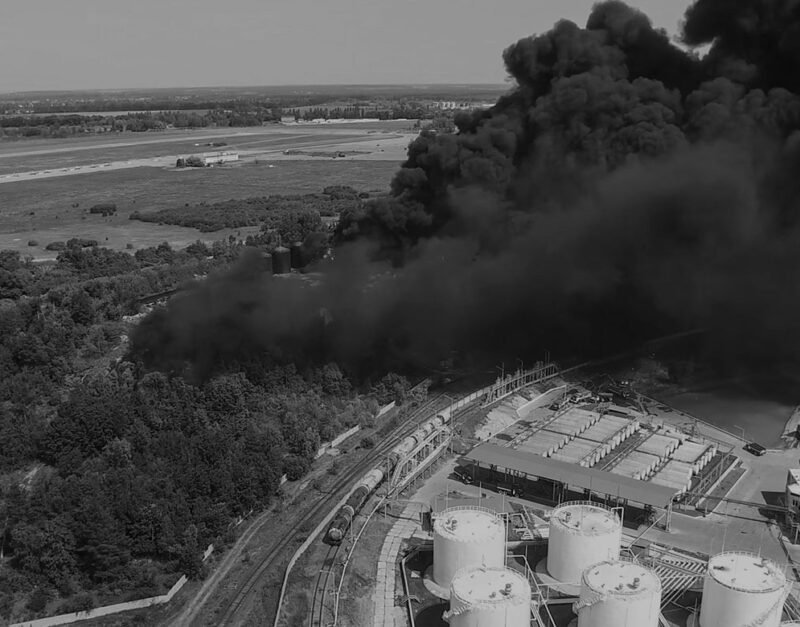 December 13, 2023
December 13, 2023 A life-threatening chemical fire at a Houston-area industrial plant is the latest example of the limits of government regulations to protect Americans from toxic exposure.
A recent joint investigation by Public Health Watch, the Texas Tribune and Grist details how Intercontinental Terminals Company (ITC) wracked up a long list of safety warnings and fines in the more than 15 years leading up to a March 2019 chemical leak that sparked a blaze that blanketed the area with toxic fallout.
Blaze Started with a Butane Leak
The origins of the catastrophe began as workers unloaded two truckloads of butane into a tank containing naphtha, an ingredient used in gasoline to increase the fuel’s octane level. By morning, a leak caused tank pressure to drop, releasing more than 9,000 gallons of the naphtha-butane mixture. According to a safety board report, the facility didn’t have a fixed gas detection system, which would have set off alarms to warn employees.
Lack of safety measures compound danger
By the time a supervisor reached the company firefighting station, flames had crawled from the 40-foot tank’s base to its roof and spread to a second tank. A gas-fueled fireball rose more than 150 feet into the air. Ash rained down on emergency responders as they fought to slow the fire spread. Billows of thick, black smoke formed an enormous plume that could be seen for miles.
Life in the danger zone
Deer Park is one of a string of suburbs that hug the Houston Ship Channel, which is lined with chemical plants, refineries, smokestacks and flare towers that burn like enormous candles over a massive industrial skyline. Residents are accustomed to the risk of explosions and chemical fires.
A 1997 explosion at a Shell Oil Company facility injured several workers and sent residents scurrying to shelter in their homes. A massive 2005 explosion at a nearby BP refinery killed 15 workers and injured nearly 200 others.
A history of warning signs
Inspectors have been citing ITC for safety violations for at least 15 years, including:
- In 2002, TCEQ investigators found startling emission levels of benzene and other dangerous chemicals outside the facility, including toluene and 1,3- butadiene, a carcinogen used in plastic and rubber products.
The incident didn’t lead to any fines. The TCEQ, the state’s primary enforcer of the federal Clean Air Act, penalized ITC only once between 2002 and 2004 – for equipment problems, not chemical leaks.
- In 2004, ITC illegally released 101 pounds of 1,3-butadiene into the air. No fines were issued. Sixteen days later, the TCEQ granted ITC permission to install an additional tank of 1,3-butadiene. It also renewed the facility’s 10-year chemical permit.
- In July 2004, inspectors concluded that ITC was responsible for high levels of benzene found in surrounding communities.
- In December 2006, a pressurized valve on a tank malfunctioned, releasing 2,076 pounds of pyrolysis gasoline, or pygas, into the air, onto the ground, and into a water-filled roadside ditch.
Pygas contains benzene and toluene. Exposure can cause symptoms ranging from dizziness and irregular heartbeat to kidney damage. In extremely high concentrations, exposure can be fatal.
Harris County sued ITC over the leak, alleging the facility had committed six separate violations of the Texas Clean Air Act and the Texas Water Code. The county updated its lawsuit less than six months later after another ITC incident where nearly 1,800 pounds of 1,3-butadiene escaped from a tank, the tank’s fourth emissions violation in as many years.
Again, no penalties.
- In 2008, ITC settled the Harris County lawsuit and agreed to abide by environmental laws and implement better management practices. A year later, after another chemical accident caused by operator error, Harris County sued again and settled for $90,000.
Not alone in exposure risk
In April 2023, a plastics fire in Richmond, Indiana, spewed toxic chemicals, including hydrogen cyanide, benzene, chlorine, carbon monoxide, and volatile organic compounds, according to EPA test results uncovered by NBC News. Of particular concern, hydrogen cyanide can be fatal depending upon the dose and length of exposure.
Benzine is a known carcinogen that causes such cancers as leukemia, multiple myeloma, and non-Hodgkin’s lymphoma in some people who have had long-term exposure. The World Health Organization (WHO) has advised there is no safe level of benzene exposure regarding cancer risk.
The EPA reported that it also found asbestos in debris samples in neighborhoods up to 1.5 miles from the fire. Asbestos is a known carcinogen related to several types of cancer, including mesothelioma, lung, laryngeal and ovarian cancers.
Bad neighbors
Wherever there are chemical plants, surrounding communities face health and safety risks. These incidents are painful reminders that while investigations can and do uncover violations, seemingly little is done to hold companies accountable. The regulatory shortcomings underscore the important watchdog role that the civil justice system can play in forcing corporations to improve safety. Individual lawsuits provide an opportunity for jurors to consider how a company’s negligence and indifference to safety can play a role in these events. In addition to providing monetary compensation for actual damages, jurors have the ability to assess additional costs as punishment for a company’s reckless or negligent safety practices.
How We Help Victims of Benzene Exposure
Seek justice with the help of our experienced attorneys. Our Dallas, Texas, benzene law firm has battled corporate giants on behalf of individuals like you for 20 years, aggressively fighting to hold them responsible for dangerous chemicals and the personal injuries and cancers they cause. If you have suffered a catastrophic injury caused by dangerous products, we can help.


